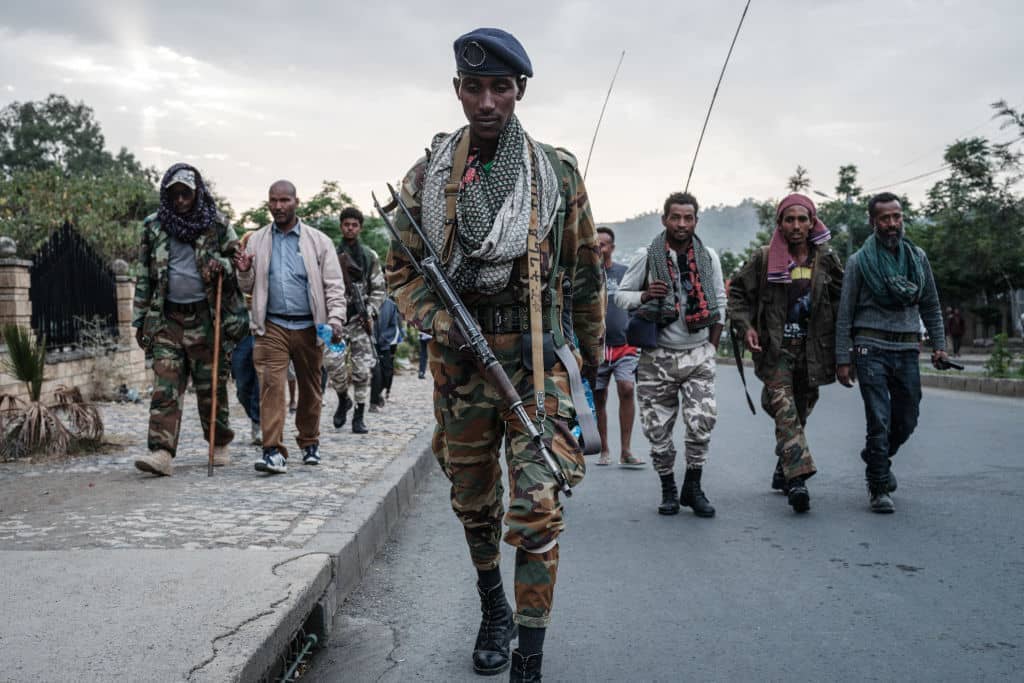There have been stunning developments recently in Ethiopia’s grinding conflict between the national government and Tigrayan rebels in the north.
Last November, the news was all about the government’s invasion of the Tigray region by federal forces. When the government claimed victory after capturing the regional capital Mekelle, Tigray was firmly on the ropes and the leadership of the Tigray People’s Liberation Front (TPLF) were being arrested or fleeing into the mountains. By June this year, Tigrayan forces regained control of the region. In doing so the rebels displayed their tenacious streak. But few envisaged what’s happening now.
Ethiopia’s cabinet has now declared a national state of emergency. Its citizens are being told to defend the capital, the rough jewel that is Addis Ababa, with advancing fighters from Tigray closing in on the city. It’s an amazing reversal of fortunes and a strange redux of history, echoing events in 1991 when Tigrayan forces led the revolutionary army that advanced on Addis to successfully overthrew the country’s military dictatorship. Except now the latest Tigrayan rebels are set to overthrow a Nobel Peace Prize winner, Prime Minister Abiy Ahmed. The West’s man looks to be in big trouble.
Hundreds of thousands of Tigrayans are facing famine-like conditions, in addition to the thousands of people already killed by the conflict
The government’s clarion call follows reports that Tigrayan forces have captured the strategic towns of Dessie and Kombolcha, some 250 miles north of Addis, well into the Amhara region. Admittedly, basic military doctrine permits that offense can be a form of defence. But I doubt the inhabitants of Amhara see it that way presently.
‘We have consistently condemned the TPLF expansion of the war outside Tigray and we continue to call on the TPLF to withdraw from Afar and Amhara,’ US Special Envoy for the Horn of Africa Jeffrey Feltman recently said.
However – and as Feltman alluded to – the TPLF might well respond that they haven’t had many options since the Ethiopian government cut off humanitarian relief and access to Tigray in June. Hundreds of thousands of Tigrayans are facing famine-like conditions according to the United Nations, in addition to the thousands of people already killed by the conflict. It’s estimated more than 2.5 million Ethiopians – primarily Tigrayans – have fled their homes.
In addition to the government’s punitive sanctions, Prime Minister Abiy has continued to up the rhetoric against Tigray. His words will certainly leave the Nobel committee blushing. Facebook just removed a post from Abiy for violating its policies against inciting violence. Abiy told citizens to ‘organise and march through [any] legal manner with every weapon and power’ and ‘to prevent, reverse and bury the terrorist TPLF.’
Throughout Ethiopia’s conflict – and as documents recently released by the whistleblower Frances Haugen recently revealed – Facebook turned a blind eye to its use by various armed groups to incite violence against ethnic minorities. Even before the conflict, ordinary Tigrayans were highly vulnerable to ethnic-based agitation. They make up only 6 per cent of the country’s population, but have long been found guilty by association with the TPLF, which led an authoritarian and cruel regime in the 1990s until Abiy became PM in 2018. When Abiy came to power he promised to clean things up. Now here we are, with Abiy increasingly authoritarian himself.
I have written before about the Tigray capital of Mekelle, and how the wide, palm-lined avenues and frisky bars and cafes that I remembered so fondly were now pockmarked by bullets or smashed by artillery. The thought of what a military assault on Addis and its five million population by a triumphantly fired-up Tigrayan force might result in does not bear thinking about. At this time of the year, the city’s population are usually basking in the succour of crisp high-altitude sunshine following three months of continuous rainfall from the Kiremt rainy season.
What happens in Africa’s second most populous country should matter to the rest of us. Primarily because its enormous population – estimated at over 110 million – have already suffered too many pains and horrors over the decades. It should also matter because of Ethiopia’s special place in the world’s consciousness as a talisman for international development and hope after its famine-stricken image seared itself into the collective global memory. But I think it also has something to do – it certainly has for me – with how we are all Ethiopian in a way. This is the land from where the first humans are thought to have migrated out of Africa 60,000 years ago.
Can Abiy hold on? Are the TPLF bluffing and positioning forces strategically to gain a stronger hand for negotiations? God knows, especially in the smoke and mirrors of Ethiopian psychology and politics. That the fate of this country and its long-suffering people could now lie in a stand-off between Ethiopia’s increasingly mercurial and obstinate prime minister and the tenaciously stubborn TPLF leaders – two sides who couldn’t loathe each other much more by this stage – should have that Nobel committee, international leaders and a great deal many others, saying and doing a lot more.






Comments